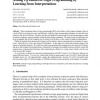Free Online Productivity Tools
i2Speak
i2Symbol
i2OCR
iTex2Img
iWeb2Print
iWeb2Shot
i2Type
iPdf2Split
iPdf2Merge
i2Bopomofo
i2Arabic
i2Style
i2Image
i2PDF
iLatex2Rtf
Sci2ools
CORR
2000
Springer
2000
Springer
Scaling Up Inductive Logic Programming by Learning from Interpretations
When comparing inductive logic programming (ILP) and attribute-value learning techniques, there is a trade-off between expressive power and efficiency. Inductive logic programming techniques are typically more expressive but also less efficient. Therefore, the data sets handled by current inductive logic programming systems are small according to general standards within the data mining community. The main source of inefficiency lies in the assumption that several examples may be related to each other, so they cannot be handled independently. Within the learning from interpretations framework for inductive logic programming this assumption is unnecessary, which allows to scale up existing ILP algorithms. In this paper we explain this learning setting in the context of relational databases. We relate the setting to propositional data mining and to the classical ILP setting, and show that learning from interpretations corresponds to learning from multiple relations and thus extends the e...
Related Content
| Added | 17 Dec 2010 |
| Updated | 17 Dec 2010 |
| Type | Journal |
| Year | 2000 |
| Where | CORR |
| Authors | Hendrik Blockeel, Luc De Raedt, Nico Jacobs, Bart Demoen |
Comments (0)

